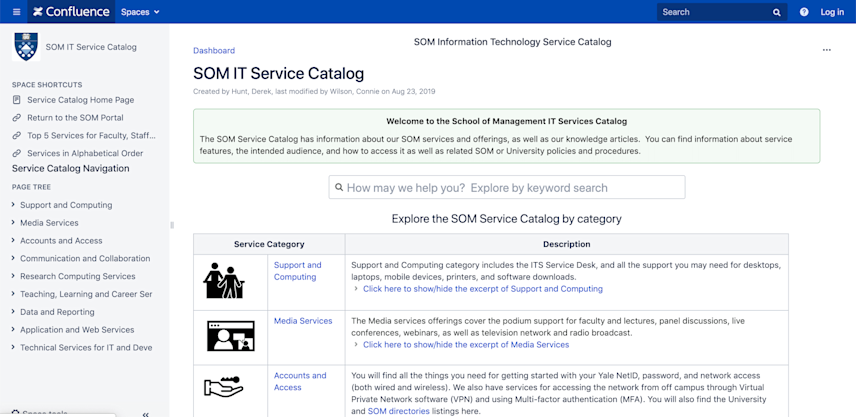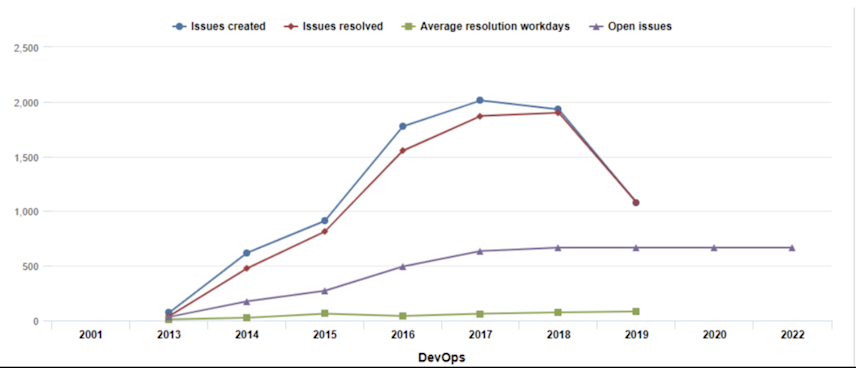How Yale School of Management meets service expectations in higher education with Atlassian
About Yale school of management
Consumer expectations for service have surged in the digital era. These high standards now extend into professional settings too, where customers assume they will get the same quality service from their employer and colleagues as they do outside of work.
Many businesses and organizations, especially those in traditional sectors like education, are struggling to keep up – not so for the Yale School of Management (SOM), a graduate school serving over a thousand students on campus and around the world. While many established IT professionals would be reluctant to change their ways and find new solutions to meet modern users’ needs, SOM’s CIO Ken Wieler has risen to the challenge.
With Atlassian, average response time has decreased by 66% and time to resolution has decreased by 57 percent.
So SOM’s IT team began exploring ways to achieve higher levels of service, help the school expand its global reach with higher-tech experiences, and build a customer-centric IT culture. After surveying potential options, they discovered Atlassian would meet all of their immediate and future needs. Confluence would serve as their knowledge base, as well as a hub for documentation and collaboration. Jira Service Management would enable IT and other departments, including Digital Communications and Business Operations, to better track requests and reduce time to resolution. Plus, Jira would help DevOps keep track of the increasing number of service requests stemming from SOM’s growing student population and project workload.
Since implementing Atlassian, SOM’s IT team has transformed the customer experience, inside and out. In addition to dramatically improving service to the Yale SOM community (to the tune of a 4.8 out of 5 satisfaction rating) and reducing the client services team’s time to resolution (by 57 percent!), they’ve also increased internal transparency and accountability while positioning SOM as a trailblazer for educational institutions around the world.
Changing needs and goals pave the way for an evolved platform
When SOM’s IT team was first confronted with the previous Dean’s new global goals, they were using different products for each function: BMC Footprints and email for Help Desk requests, Basecamp for managing development projects, and what Ken lovingly refers to as “a hodgepodge of tools” for documentation and collaboration. Each tool had shortcomings that were getting worse as IT started working toward the school’s new ambitions.
The team says Footprints was a “cumbersome tool” that made it difficult or impossible to track service level agreements and view metrics in context to understand where to dedicate their time and effort. Additionally, departmental knowledge was dispersed in various forms of storage, hard to find, or held exclusively in individuals’ memories. DevOps Engineer Matt Dell explains, "Team members, including me, didn’t effectively share information that everyone could use in resolving service requests. I think that was a product of a couple things: not having a ‘home’ for the information; documentation being painful to write; and work silos (‘Nobody else needs to know this’)."
User needs had changed, objectives had evolved, and now SOM’s tools needed to adapt too. Ken’s group began researching solutions, including Atlassian, Zendesk, and ServiceNow. Atlassian emerged as the top choice based on their familiarity with Jira and Confluence, the customizability of Jira Service Management, and integrations with Slack for real-time updates.
These tools have immensely improved our service. Now we can’t do without them because our community is used to that level of service.
Ken Wieler
CIO, Yale School of Management
Three IT functions, one comprehensive platform
After deciding to implement Atlassian, the DevOps team took the lead on SOM’s migration and configured the solution to work for all three IT functions: DevOps (which runs all backend systems), Client Services (which serves Yale SOM’s community of students, faculty, and other end users), and Media Services (which handles audio/visual technology for the school’s new, state-of-the-art building).
As for their own team, DevOps developed ticketing systems and workflows that integrated Jira, Jira Service Management, and Slack to support the full development lifecycle, including software development, bug tracking, issue management, asset management and service requests from the community (which DevOps also handles). Over time, they’ve also implemented dozens of Marketplace Apps (including Automation for Jira, and Gliffy Diagram for Confluence) that they say SOM can’t live without.
For example, IT developed a solution for instant classroom tech support by using the Automation for Jira app to connect Jira Service Management and Slack. Whenever a student or presenter touches the “Help” button on a room’s A/V control panel, a Jira Service Management ticket is automatically created and a Slack message is posted in the Media Services channel so a team member can respond immediately. The NextUpAI bot allows employees to assign someone to work on the request and make comments, log time, and transition the issue, all in Slack.

Matt says this is one example of a solution that solves several problems at once, adding value on multiple fronts. “These tools improve service because we can address issues immediately,” he explains. “They also give us better metrics to tell how many issues we’re having and understand whether they’re a malfunction or if a specific user needs extra training and support. We can’t do without that.”
The SOM IT department also set up a three-tiered service desk, aggregating the team’s detailed notes on policies, procedures, and FAQs in an extensive self-service catalog in Confluence. This catalog serves as a knowledge base for the community as well as the employees serving them.

As these solutions were launched and adopted, non-technical departments at SOM began to consider how Atlassian could help solve their challenges too. For instance, Director of Digital Media Amy Kundrat saw an opportunity to apply Atlassian in the Communications department. She worked with DevOps to set up Jira Service Management for managing requests for communications and marketing materials like brochures, business cards, and other collateral; Confluence for documenting current projects and historical content; and Jira for project management. About half of the department organically adopted the new solution. Amy then worked with DevOps to bring adoption to 100 percent.
Matt says Atlassian has now become “indispensable” for SOM’s IT team. Ken adds, “These tools have immensely improved our service. Now we can’t do without them because our community is used to that level of service.” As more departments like Communications catch on, Matt and Ken both expect Atlassian’s impact on the school and its community to grow.
Elevating service to meet rising expectations
Now, just a few years into their Atlassian journey, Yale SOM’s IT team has made significant progress toward achieving school-wide goals, and sees the potential for making an even greater impact on a larger scale.
Perhaps the biggest improvement has been in SOM’s IT service delivery. Despite the student population growing by half and service requests increasing 300 percent from 2014-2017, SOM has leveraged their integrated Atlassian solution to reduce average response time for student requests to two hours – a decrease of 66 percent from 2017-2018 alone. Now that the team can track and prioritize requests based on wait times, time to resolution has also decreased by 57 percent.
Abby Loesch, a student at SOM, explains that these high service levels are especially important to meet the needs of business-minded, tech-savvy students. "As business school students, many of us have worked in places with efficient IT teams before coming back to school, so our expectations for service delivery are higher,” she says. “But I was really impressed with the IT team at SOM. It’s so easy to get help, and they always resolve whatever issue I have really quickly."

The number of service requests has also decreased by 50 percent since 2017 thanks to a number of improvements, including standardizing on Confluence as the team’s internal and customer-facing knowledge base to support more self-service.
Matt says that, while change management is rarely easy, it has been worth it for SOM. "It’s no small task to change the culture of a workplace. Having Atlassian built around and helping to evolve our practices, along with internal champions for adopting Atlassian and service management methodology, has been and continues to be instrumental in any improvements."
In addition to elevating service levels, Client Services’ Connie Wilson and Digital Media’s Amy Kundrat say they love the transparency and accountability Atlassian gives their teams. Amy explains, “I sit next to a colleague who produces video. If I need that video for a campaign, I can look in Jira to see who’s producing the video, what the video is for, the status of the task, and more. This has helped us work more efficiently and significantly cut down on meetings and emails.”
Ken reports that other departments, as well as other schools throughout Yale, are recognizing the difference SOM’s unique, customer-centric approach is making and asking how they can implement similar solutions.
“When students, faculty, and staff have a question, whether it is regarding technology, facilities or other services, they don't care where the support is coming from – they just want to get help,” Ken says. "Our goal is to work collaboratively with all SOM departments to have a single service delivery methodology so we can route any request to the right person using tools such as Atlassian offers. It’s an ambitious vision, but with everyone’s support, I feel we can get there."
About Yale school of management
Industry
Education
Number of users
33 IT employees
Location
New Haven, Connecticut
Atlassian Marketplace Apps
Check these out

